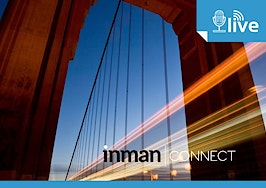Enjoy the Connect experience from your computer, laptop or tablet! Watch Connect now.
Takeaways:
- Ownership of a smart home system: How does access transfer at sale?
- Agents will be able to monitor buyers’ biological reactions to listings.
- Zero-interface systems: No-contact, behavioral sensors to control home access will emerge in next five years.
SAN FRANCISCO — While we don’t yet have to worry about computer mainframes sending robotic assassins back in time, the machines are indeed advancing quickly.
Smart home technology is rising in intelligence and declining in cost, according to experts who spoke at a panel at Inman’s Tech Connect event Tuesday.
[Tweet “Smart home technology is rising in intelligence and declining in cost.”]
Simple examples include automated window treatments that shut when the sun hits and refrigerators that remind us to buy more milk.
However, systems can be upscaled quickly to include thermostats that sense spikes in body temperature, drops in air quality and Siri-like voice control.
Smart home systems will become “the new granite countertops,” according to Chad Curry, managing director for NAR’s Center for Realtor Technology.
[Tweet “Smart home systems will become the new granite countertops.”]
However, granite countertops don’t require private-access credentials to be turned over at closing.
Can the seller still control the built-in cameras after they hand over the code to the smartphone deadbolt?
How about when a divorce occurs? Is the agent representing the party who just happens to “not know anything about” that stuff?
Biometric systems are being tested today that track the way people move around homes, measuring biological rhythms generated from reactions to rooms or colors.
When connected to a smartphone, listing agents can use that data to know before a buyer enters the breakfast nook whether they’re the right buyers or not.
This raises ethical concerns about what level of monitoring via smart home tools should be expected during showings.
Jason Johnson, CEO and co-founder of August, sees “zero-interface” home systems as the future. “The best interface is no interface,” he shared.
Zero interface means door locks that will open for you as you approach it, but not for the FedEx guy when he’s dropping off your Amazon Prime delivery.
Thermostats will raise the home comfort system a couple of degrees moments before you reach for the sofa throw.
Smart home technology is growing quickly, and so are the ethical best practices that will govern its role in buying and selling.



